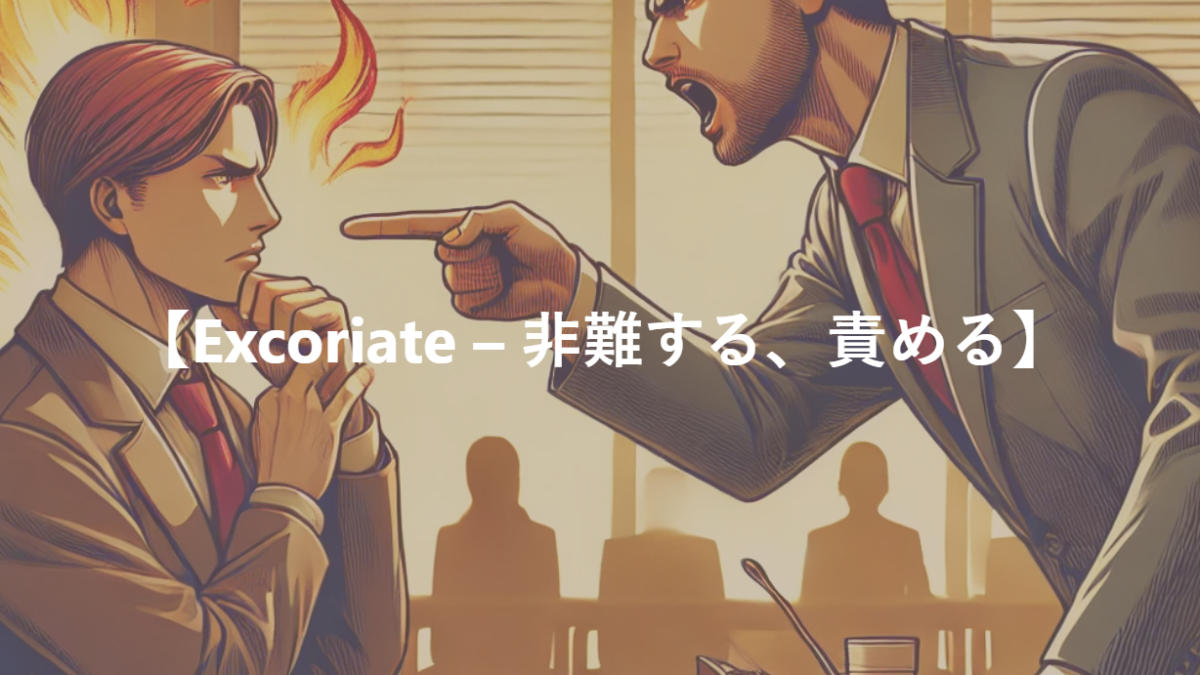派生語・語源・類義語・反対語・例文
派生語や動詞の活用
派生語や関連語
Excoriation:
これは名詞形で、「厳しい非難」または「皮膚の剥離」を意味します。
動詞の活用
- Base Form (基本形): excoriate
- Past Simple (単純過去形): excoriated
- Past Participle (過去分詞): excoriated
- Present Participle / Gerund (現在分詞): excoriating
- Third Person Singular (三人称単数現在形): excoriates
【Excoriate – 非難する、責める】という単語の語源とか由来を知っていますか?
「Excoriate」はラテン語の「excoriatus」に由来し、これは「ex-」(外へ)と「corium」(皮膚)から成り立っています。したがって、「Excoriate」は文字通り「皮膚を剥がす」という意味を持ち、転じて非難や厳しい批判を意味するようになりました。
「Excoriate」は一般的に批判や非難を表現するために使用されます。この単語は、特にメディア、政治、文学、芸術などの分野でよく見られ、他者の行動や発言に対する厳しい批判や非難を示すために用いられます。また、医学の文脈では皮膚を剥がすことを指すこともあります。
この単語の類義語・反対語を教えてください。
類義語:
- Criticize(批判する)
- Censure(非難する)
- Denounce(非難する)
- Condemn(非難する)
反対語:
- Praise(賞賛する)
- Commend(賞賛する)
- Applaud(称賛する)
- Appreciate(評価する)
この単語に似た単語で間違いやすい単語はありますか?
「Excoriate」は比較的特定の意味を持つ単語であり、混同されることは少ないです。ただし、非難や批判を表現する他の類似した単語として「Criticize」や「Censure」があります。
この単語を使った例文を5つほど教えてください。
- The journalist excoriated the government’s handling of the crisis in her scathing editorial. (そのジャーナリストは、鋭い社説で政府の危機対応を非難しました。)
- The movie critic excoriated the film, calling it one of the worst he had ever seen. (映画評論家はその映画を酷評し、これまで見た中で最悪の一つと評しました。)
- The opposition party excoriated the proposed legislation, arguing that it violated basic rights. (野党は提案された法律案を非難し、基本的な権利を侵害していると主張しました。)
- The professor excoriated the student’s paper for its lack of research and critical analysis. (教授は学生の論文を研究不足と批判的な分析の不足で非難しました。)
- The CEO was excoriated by shareholders for the company’s poor financial performance. (CEOは会社の財務パフォーマンスの低さで株主から非難を浴びました。)
コロケーション
- Excoriate a politician: 政治家を非難する
- Excoriate the media: メディアを非難する
- Excoriate publicly: 公然と非難する
- Excoriate harshly: 激しく非難する
- Excoriate someone’s actions: 誰かの行動を非難する
「Excoriate」という言葉は、「非難する」や「責める」という意味を持ち、強い批判を表す際に使われます。例えば、Excoriate a politician ですが、これは「政治家を非難する」という意味です。政治家の行動や発言に対して強く批判する場合に使用されます。
次に、Excoriate the media は「メディアを非難する」を意味し、メディアの報道や取材に対して強い批判が向けられる状況を示します。
また、Excoriate publicly という表現は「公然と非難する」を意味します。多くの人々の前で、ある人物や団体に対して批判を行う場面を表します。
Excoriate harshly は「激しく非難する」という意味で、非常に厳しい言葉や態度で批判をする際に使用されます。
最後に、Excoriate someone’s actions ですが、これは「誰かの行動を非難する」を意味し、特定の行動や決定に対して強い批判を行う場面を表現します。
The word “Excoriate” means “to criticize” or “to censure,” and is used to express strong criticism. For example, Excoriate a politician means “to criticize a politician.” It is used when someone strongly condemns a politician’s actions or statements.
Next, Excoriate the media means “to criticize the media.” It refers to situations where strong criticism is directed toward media reporting or coverage.
Additionally, Excoriate publicly means “to criticize publicly.” This phrase is used when criticism is made openly in front of many people, targeting a particular person or organization.
Excoriate harshly means “to criticize harshly.” It is used when criticism is expressed with very harsh words or attitudes.
Lastly, Excoriate someone’s actions means “to criticize someone’s actions.” This phrase describes situations where strong criticism is directed toward specific actions or decisions made by a person.
Excoriate を使った英文法問題5問
- The critic _____ the film for its shallow plot and underdeveloped characters.
- (A) excoriate
- (B) excoriates
- (C) excoriated
- (D) excoriating
- 解説: 文脈から過去時制が適切であり、主語が単数なので、動詞に”-d”を付けて過去形にします。
- The politician’s opponents _____ them for their handling of the economic crisis.
- (A) excoriate
- (B) excoriates
- (C) excoriated
- (D) excoriating
- 解説: 文脈から過去時制が適切であり、主語が複数なので動詞に”-d”を付けて過去形にします。
- The professor _____ the student for plagiarizing their essay.
- (A) excoriate
- (B) excoriates
- (C) excoriated
- (D) excoriating
- 解説: 文脈から過去時制が適切であり、主語が単数なので、動詞に”-d”を付けて過去形にします。
- The newspaper’s editorial _____ the government’s inaction on climate change.
- (A) excoriate
- (B) excoriates
- (C) excoriated
- (D) excoriating
- 解説: 文脈から過去時制が適切であり、主語が単数なので、動詞に”-d”を付けて過去形にします。
- The athlete was _____ by the media for their poor sportsmanship during the match.
- (A) excoriate
- (B) excoriates
- (C) excoriated
- (D) excoriating
- 解説: 受動態の文なので、be動詞(was)の後に続く過去分詞(excoriated)が適切です。

